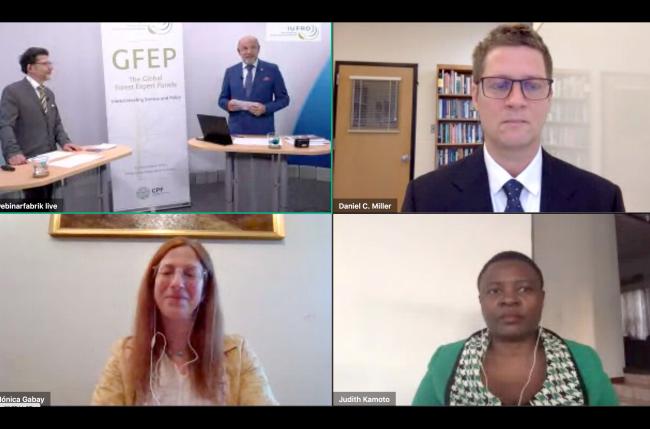This event was the culmination of an expert-driven process initiated in 2019 to assess the available scientific information on the relationship between forests, trees, and poverty, and constituted the official launch of the resulting assessment report and accompanying policy brief. As was the case for the last expert meeting in April 2020, the launch of the report was moved online due to the COVID-19 pandemic.
Alexander Buck, Executive Director, International Union of Forest Research Organizations (IUFRO), moderated the event and highlighted the timeliness of the report, given the pandemic poses a significant challenge to poverty reduction efforts. In their respective opening remarks, Hiroto Mitsugi, Assistant Director-General, Food and Agriculture Organization of the United Nations, and Christoph Wildburger, Coordinator, Global Forest Expert Panels (GFEP), underscored the importance of forest resources for poor and vulnerable communities, not only in terms of income but also for shelter and nutrition.
Daniel C. Miller, Chair, GFEP on Forests and Poverty, and Coordinating Lead Authors Judith Kamoto, Mónica Gabay, and Priya Shyamsundar shared insights into the findings of the assessment process and responded to questions from participations.
Key messages are highlighted below.
- Forests and trees support human well-being and are critical to end poverty.
- Benefits from forests and trees to human well-being are unevenly distributed.
- Forests and trees can help the poor in facing global changes such as climate change.
- Structural barriers prevent poor people from using forest and tree products to exit poverty.
- Inadequate land use policies may lead to the poor bearing excessive costs.
- Forest-poverty dynamics are affected by a range of social, economic, political, and environmental context factors, such as rural outmigration, gender norms, remittance flows, and elite capture.
- Policy and management measures that enable forests and trees to contribute to poverty alleviation, such as those promoting ecotourism or agroforestry, need to be tailored to each specific context.
